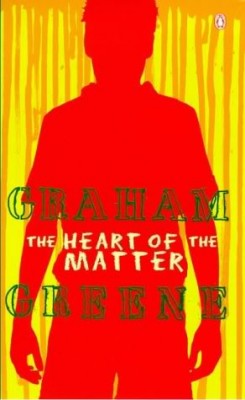A small cicatrice had been made on the memory

The Heart of the Matter
by Graham Greene
I read this as part of Greene for Gran, a challenge run by Simon of Savidge Reads in honour of his recently departed grandmother, as Greene was her favourite author. Strictly the challenge was intended to run just for August but I got a bit behind. Sorry, Simon! Anyway, on to the book…
Initially the narrative switches between two characters in a West African country – a policeman called Scobie and an accountant called Wilson – but it gradually becomes clear that Scobie is our hero, with Wilson merely a player in his story. They are both Brits, serving time in a British colony that is at war (I wasn’t entirely clear if this was a civil war, a war with a neighbouring country, or the tail end of the Second World War).
“A vulture flapped and shifted on the iron roof and Wilson looked at Scobie…He couldn’t tell that this was one of those occasions a man never forgets: a small cicatrice had been made on the memory, a wound that would ache whenever certain things combined – the taste of gin at midday, the smell of flowers under a balcony, the clang of corrugated iron, an ugly bird flopping from perch to perch.”
Scobie doesn’t love his wife Louise, indeed they have been growing apart for years, but he does love this un-named country he has been living in for 15 years and he feels a strong sense of duty to look after Louise, who suffers from insecurity and depression, and he would do anything to protect her. Except lie. Because Scobie is so honest it’s painful. The book opens with him being denied a promotion because everyone is suspicious of him, or at least uneasy about him, because his level of honesty just cannot be believed.
“There was no reason to call…yet it was his habit to cry her name, a habit he had formed in the early days of anxiety and love…When he called her name he was crying like Canute against a tide – the tide of her melancholy and disappointment.”
Wilson, on the other hand, is clearly a liar from the start. He goes to great lengths to hide his love of poetry, but it is just that love that leads him to Louise, with whom he falls hopelessly in love. She’s simply amused by him, and that would be that were it not for an unfortunate combination of circumstances. Wilson is far from being a mere accountant. And Scobie is gradually getting tangled up with some shady Syrian businessmen and then, at the least expected moment, he meets another woman.
“He told himself: Be careful. This isn’t a climate for emotion. It’s a climate for meanness, malice, snobbery, but anything like hate or love drives a man off his head.”
Scobie is so tortured it’s almost ridiculous. His Catholicism plays an increasingly large role, highlighting how the average person can commit all kinds of sins and then renounce them at mass, while Scobie wrings his hands at the very idea. To be honest, I found Scobie deeply frustrating but he still got my empathy and I really did care about the outcome for him.
“The truth, he thought, has never been of any real value to any human being – it is a symbol for mathematicians and philosophers to pursue. In human relations kindness and lies are worth a thousand truths. He involved himself in what he always knew was a vain struggle to retain the lies.”
One other thing that frustrated me about this book was the undercurrent of racism. It was written in the 1940s so I know it’s unfair to hold it to today’s standards but it’s still pretty shocking to read the language used about the native people, or indeed all non-Brits. Not just the “n” word, but the way the occupiers talk to them in condescending language that’s even simpler than the natives’ pidgin English. The way the Brits all have a house boy whom they call “boy”, whether that servant is 10 or 50 years old. The way not one of the natives gets to be a fleshed out character (though at least one of the Syrians is humanised a bit; in fact he’s a very interesting man).
Something I found curious about this novel is the way that it’s divided up so much. There are three “books”, divided into parts, divided into chapters, divided into numbered sections. It’s almost like an academic textbook except that the numbers always start again at 1. There’s something oddly disconcerting about turning to page 218 and it saying “chapter 2”.
But all the frustrations and oddities aside, this is a beautifully written book that really closely examines the human heart and how people can misunderstand so horribly what each other thinks or feels. The ending is heart breaking and made me almost want to throw the book down except that the language kept me spellbound.
“He felt no jealousy, only the dreariness of a man who tries to write an important letter on a damp sheet and finds the characters blur.”
So thank you Simon for the prompt to read more Greene. I’ll certainly come back to him again. And he wrote a lot of stuff, so there’s plenty to come back to!
First published 1948 by William Heinemann.
Source: Part of a set of beautiful Penguin books I bought several years back, can’t remember where from.
Challenges: This counts toward the 2013 TBR Pile Challenge.
Glad you enjoyed this. I also read it as part of Greene for Gran. I was fascinating to learn that Greene never intended Scobie to be a sympathetic character and was greatly surprised when his readers empathised with him
Karen Huh, that is indeed fascinating. I kinda understand, but then who were we meant to sympathise with? Maybe no-one.